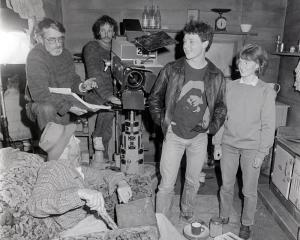
For all the talk about making Dunedin "the greatest small city in the world", there is a glaring omission in how we plan it: the 20,000 students who make the city hum.
Over the past year as Otago University Students Association president, I have sat through countless planning meetings and strategy sessions.
Again and again, I have been struck by how little students feature in the thinking that shapes Dunedin’s future.
It is not that we’re ignored; we’re invisible. When we do appear, it’s usually as a problem to be managed rather than a community to be engaged with.
Despite the noise about student exclusion from city planning, we’re mentioned just three times in the Dunedin City Council’s nine-year plan.
Two of those references describe students as tools for economic development; the third concerns accommodation, not student life.
For a city that relies so heavily on its tertiary sector, students remain an afterthought in policy and planning.
That blind spot isn’t malicious; it’s habitual. It’s the quiet assumption that students will always be here, the university will always be strong, and Dunedin’s identity will somehow sustain itself.
But that complacency is dangerous.
Dunedin’s greatest competitive advantage isn’t its scenery, its climate or even its heritage. It is the presence of world-class tertiary institutions that injects life, ideas and, of course, billions into the local economy.
One in four Dunedin residents is a student. They power the hospitality sector, fill creative spaces, volunteer in the community, drive our music and arts scene, and give the city its distinctive mix of mischief and vitality.
And yet we plan and legislate as though they don’t exist.
We debate alcohol policy without considering the lived realities of Castle St. We design housing regulations without thinking of those most affected by damp, cold flats.
We talk about economic diversification while overlooking our biggest export sector is tertiary education itself.
I am not writing this as a plea for sympathy, but as a warning and an opportunity.
Dunedin could be the southern hemisphere’s model university city: collaborative, innovative and youth-driven.
But that requires the council, the university and the community to act as partners, not as neighbours separated by the Leith.
The Tertiary Precinct Planning Group was a step in the right direction, but in recent years, it has lost focus and visibility.
Crucially, it lacked any student representation, leaving decisions disconnected from the people who actually live there.

North Dunedin faces unique challenges: high-density housing, glass, short-term tenancies, rental quality decline, large stakeholders and a lack of co-ordinated oversight.
It deserves the same attention and investment as any other community.
We’ve begun to act as if having a world-class university is as permanent as the harbour or the hills, but universities don’t stay world-class on autopilot.
They thrive when cities are proud to host them, when education is treated as part of civic identity, not merely an export industry.
Look north to Hamilton. Faced with funding cuts and declining enrolments, it fought to protect its tertiary identity, even by replicating Dunedin’s own success through a new medical school modelled on Otago.
If Dunedin loses its reputation as a vibrant, student-centred city, the consequences will cut through the whole city.
Dunedin is lucky to host one of the world’s oldest and most respected universities, but luck runs out when it isn’t matched by leadership and common vision.
If we want to be the greatest small city in the world, it starts by remembering who keeps it ticking.
That doesn’t mean idealising student culture or denying the city’s challenges with noise, alcohol harm or poor housing.
I have lived it and led it. Those problems are real and long-standing, but they can’t be solved in isolation.
Real progress will come when the city sees students as partners, people who care deeply about Dunedin, who vote here, start businesses here, and stay to raise families here.
Because make no mistake: other cities are competing for the same students, researchers and ideas that built Dunedin’s reputation.
If we keep assuming the university will always attract bright minds and global talent, we are fooling ourselves.
We talk a lot about attracting visitors and investment, but the best investment Dunedin can make is in the people who are already here: the ones filling our libraries, studios, cafes and lecture theatres.
They want to stay if the city gives them a reason to: jobs, warm homes and a community that welcomes them.
So here is the challenge. Over the years ahead, the new city council and the university will continue to plod along, but change is needed.
Put students at the table. Call a meeting of the Tertiary Precinct Planning Group, including student representation. Propose a North Dunedin and Northeast Valley community board, giving an authentic voice to nearly a quarter of the city.
And above all, let’s commit to a vision where town and gown celebrate, not tolerate, each other’s success.
If Dunedin truly wants to be the greatest small city in the world, it’s time to start acting like one.
— Liam White is the outgoing president of the Otago University Students Association.











